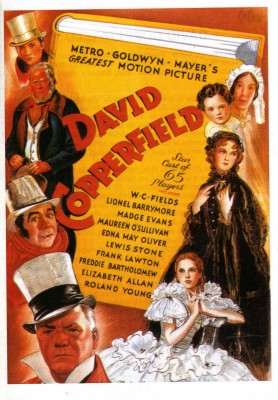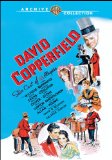| Reviews & Columns |
|
Reviews DVD TV on DVD Blu-ray 4K UHD International DVDs In Theaters Reviews by Studio Video Games Features Collector Series DVDs Easter Egg Database Interviews DVD Talk Radio Feature Articles Columns Anime Talk DVD Savant Horror DVDs The M.O.D. Squad Art House HD Talk Silent DVD
|
DVD Talk Forum |
|
|
| Resources |
|
DVD Price Search Customer Service #'s RCE Info Links |
|
Columns
|
|
|
Personal History, Adventures, Experience, & Observation of David Copperfield the Younger, The
Warner Home Video first released David Copperfield to DVD in 2006. That release went out-of-print, but returns here as a Warner Archive DVD-R release with all the original extra features intact.
In 1820s Norfolk, England, David Copperfield is born to his newly widowed mother, Clara (Elizabeth Allan) and reared by grandmotherly nurse Peggoty (Jessie Ralph). Clara marries sadistic control freak Mr. Murdstone (Basil Rathbone), who delights in tormenting young David (Freddie Bartholomew), while Murdstone's equally severe and furry-browed sister, Jane (Violet Kemble Cooper), assumes control of the household.
David finds solace in Peggotty's love and nurturing, especially when she takes him to visit her seaside family: crusty, seaman brother Dan (Lionel Barrymore), his adopted daughter Em'ly (Faye Chaldecott) and her cousin, Ham (John Buckler).
When Clara dies during childbirth, Murdstone seizes the opportunity to ship David off to London to apprentice under loquacious but kind-hearted Wilkins Micawber (W.C. Fields). When forever-in-debt Micawber is sent to prison, David flees oppressive working conditions to the safety of his Aunt Betsey (Edna May Oliver), who lives in Dover with her eccentric cousin, Mr. Dick (Lennox Pawle, a dead ringer for comedian Benny Hill).
As he grows into manhood, David (now played by Frank Lawton) pursues a writing career while in the custodianship of elderly alcoholic Mr. Wickfield (Lewis Stone), who lives with his daughter, Agnes (Madge Evans), and Wickfield's obsequious but conniving clerk, Uriah Heep (Roland Young). Agnes falls in love with David, but he's attracted to empty-headed Dora (Maureen O'Sullivan), whom he meets while at the company of an old school chum, Steerforth (Hugh Williams).
Selznick hoped to divide David Copperfield into two seperate films but studio head Louis B. Mayer wasn't keen on the project from the start, and a single, 130-minute feature resulted. Dickens's book runs 600-plus pages, and the adaptation, while still eliminating numerous characters and big chunks of the narrative, such as David's time at Salem Hill Boarding School, unwisely attempts to pack as much raw material from the book in as possible. The result is a CliffNotes adaptation, with major and minor characters rushing on and rushing off so fast the viewer rarely has enough time to make any kind of emotional investment. Others, like Steerforth, are introduced with little to no explanation at all.
The bigger problem is that David Copperfield doesn't really tell its story through its title character's experiences. The movie is dominated by wide, static shots inhabited by three or more characters at once, via proscenium arch staging. Scenes play out without nearly enough cutaways to and close-ups of David, and he gets lost in the jumble. Lean's Great Expectations likewise follows its main character from boy- to manhood, but emphatically tells its story from his perspective: his fear of anthropomorphized trees at his mother's graveside, low-angle shots looking up at the escaped convict Magwitch, similar low-angle shots of lawyer Mr. Jaggers, emphasizing that character's considerable girth.
There is some of this in David Copperfield but not enough: David's dread as Murdstone taunts him during a lesson, threatening him with a riding crop; David's abject panic when, trapped in his bedroom, he realizes that his mother is on her deathbed. Those scenes have an emotional realness generally lacking elsewhere. By the time David becomes an adult the audience isn't emotionally invested in his fate any more, particularly as so much of the film is clearly more interested in its colorful character vignettes instead. Everyone remembers Freddie Bartholomew while practically no one remembers actor Frank Lawton or his characterization of David.
Further damaging the film are some of the performances. While Roland Young (especially), Basil Rathbone, Edna May Oliver, and Jessie Ralph all beautifully capture the essence of their characters, physically matching Dickens's descriptions of them to boot, others just don't play well at all. Elizabeth Allan is overly theatrical, even maudlin, as the saintly Clara, and her scenes with Bartholomew reek with syrupy sentiment. Though widely acclaimed at the time, today Bartholomew comes off as a limited child performer who's only as good as the actor he's playing his scenes with. He's better, for instance, with Jessie Ralph than he is with Allan. Part of the fault probably lay with director George Cukor, whose direction is lacking in empathy for David and his trials.
Vaudevillian comedian W.C. Fields replaced Charles Laughton, who quit the production several days into filming, unhappy with his own performance. Though decidedly American, Fields was an inspired choice, but even here compromises were made. Probably because he was a last-minute replacement, Fields was forced to read his long, wordy monologue from cue cards, a painfully obvious concession in several scenes where he's awkwardly photographed in profile. But Dickensphile Fields strikes exactly the right note as Micawber; it's an impressive, slightly against-type characterization. Alas, like most everyone else, he comes and goes with the wind.
In other ways though, David Copperfield is quite an accomplishment. Its recreation of 19th-century England is utterly convincing; it wouldn't have been more authentic had it actually been shot there. The backlot streets, glass matte paintings, set decoration, and costumes are all beautifully done, while its stormy shipwreck climax, done mostly by compositing live actors against a miniature set, is extremely good by 1930s standards.
Video & Audio
In its original full frame format, David Copperfield generally looks okay, though it's still pretty grainy, and some scenes, possibly cut for reissue, are more dog-eared than others. The English mono is adequate, English, Spanish, and French subtitles are offered, and the disc is region-free.
Extra Features
Supplements are identical to the earlier DVD version. Included are three shorts: a mediocre cartoon called Poor Little Me and two musical shorts, Two Hearts in Wax Time and Pirate Party on Catalina Isle (all 1935). The latter, filmed in early three-strip Technicolor, is particularly fascinating both for its look at Catalina Island in the mid-1930s and for its many star cameos: Errol Flynn, Cary Grant, Randolph Scott, Marion Davies, etc.
Parting Thoughts
Flawed but definitely worthwhile, David Copperfield is a handsome prestige production with a lot of class undermined by many compromises to its original source. Still, Highly Recommended.
Stuart Galbraith IV is a Kyoto-based film historian whose work includes film history books, DVD and Blu-ray audio commentaries and special features. Visit Stuart's Cine Blogarama here.
|
| Popular Reviews |
| Sponsored Links |
|
|
| Sponsored Links |
|
|
| Release List | Reviews | Shop | Newsletter | Forum | DVD Giveaways | Blu-Ray | Advertise |
|
Copyright 2024 DVDTalk.com All Rights Reserved. Legal Info, Privacy Policy, Terms of Use,
Manage Preferences,
Your Privacy Choices | |||||||













